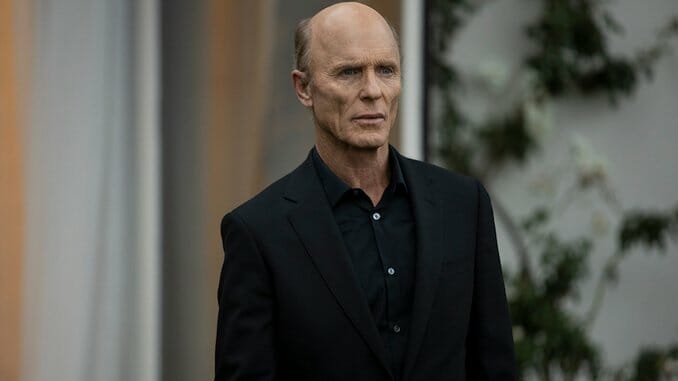Westworld Season 3 Finale: All Roads Lead Back to the Man in Black
Photo Courtesy of HBO
Though Westworld Season 3 moved from the fictional world of the Delos parks to the dystopian landscape of our own real-world future, the show continues to wrestle with many of the same philosophical themes it always has: Free will. Determinism. Fate. What does it mean to be human? Are we capable of choosing the people we become? Or are we doomed to lives that circle the same loops, despite our best efforts?
While this season of the show may be more straightforward narratively than its puzzle-box laden predecessors, after the Season 3 finale, the answers to those questions aren’t any clearer than before.
Dolores’ mission to bring down Serac and the massive supercomputer divining the fate of the world via algorithm drives much of the season. But the question of her motives is always a murky one. Does she desire to lead a robot revolution to overthrow humanity? Make a safe space for herself and her fellow robot-kind? Or something else entirely?
At the end of the season, Dolores insists her actions have been altruistic ones. That she believes in free will, and wants humanity to do the work to forge a better future. She’s choosing to see the beauty in the world, remembering the kindness and love of her many lives, rather than violence and pain. And the mental image that Dolores returns to again and again is William—both as his younger self and the older Man in Black—picking up a can in the street. It’s much the same way that Westworld keeps returning to this character repeatedly, even when virtually all narrative logic says his story should be over.
Perhaps it’s simply sentiment. William was Dolores’ first love, her first great betrayer, and the key that unlocked her understanding of both her own consciousness and the world around her. Their relationship is a linchpin in her life, after all, for both good and ill. But this is Westworld; and nothing’s ever that simple.
The Man in Black was an iconic figure in Season 1, an over-the-top Wild West villain come to life who spent much of his time venting his inner darkness on the park’s host population and chasing in-game mysteries only he ever thought existed. But as the show shifted into the real world, it felt as though the character was something best left behind with the big hats and horses in the park.
But he wasn’t. Granted, William did have something of a reduced presence this season, but his character remains a constant even as his arc is increasingly disconnected from Westworld’s main narrative. If we’re honest, Season 3’s story could have very easily happened without him, and one of the big questions of this season is what, precisely, William is doing here at all.
Like virtually everything else on this show, the answer to that is unclear. Yet, in a season that espouses the idea of choice, it makes sense that Dolores and William, the two characters who have insisted on the inviolate nature of their own identities, are at the center of it.
“You’ve done terrible things and you’ve done generous things. She didn’t choose you for your capacity for violence, but for your capacity to choose.” Maeve says these words to Caleb in the Season 3 finale, but they’re an echo of a story we’ve seen before.
-

-

-

-

- Curated Home Page Articles By Test Admin October 21, 2025 | 3:10pm
-

- Curated Home Page Articles By Test Admin October 21, 2025 | 2:57pm
- Urls By Test Admin October 21, 2025 | 2:57pm
- Curated Home Page Articles By Test Admin October 21, 2025 | 2:55pm
-

-

-

-

-

-

-

-

-

-

-

-

-

-

-

-

-

-

-

-

-

-

-

-

-

-

-

-

-

-

-




































